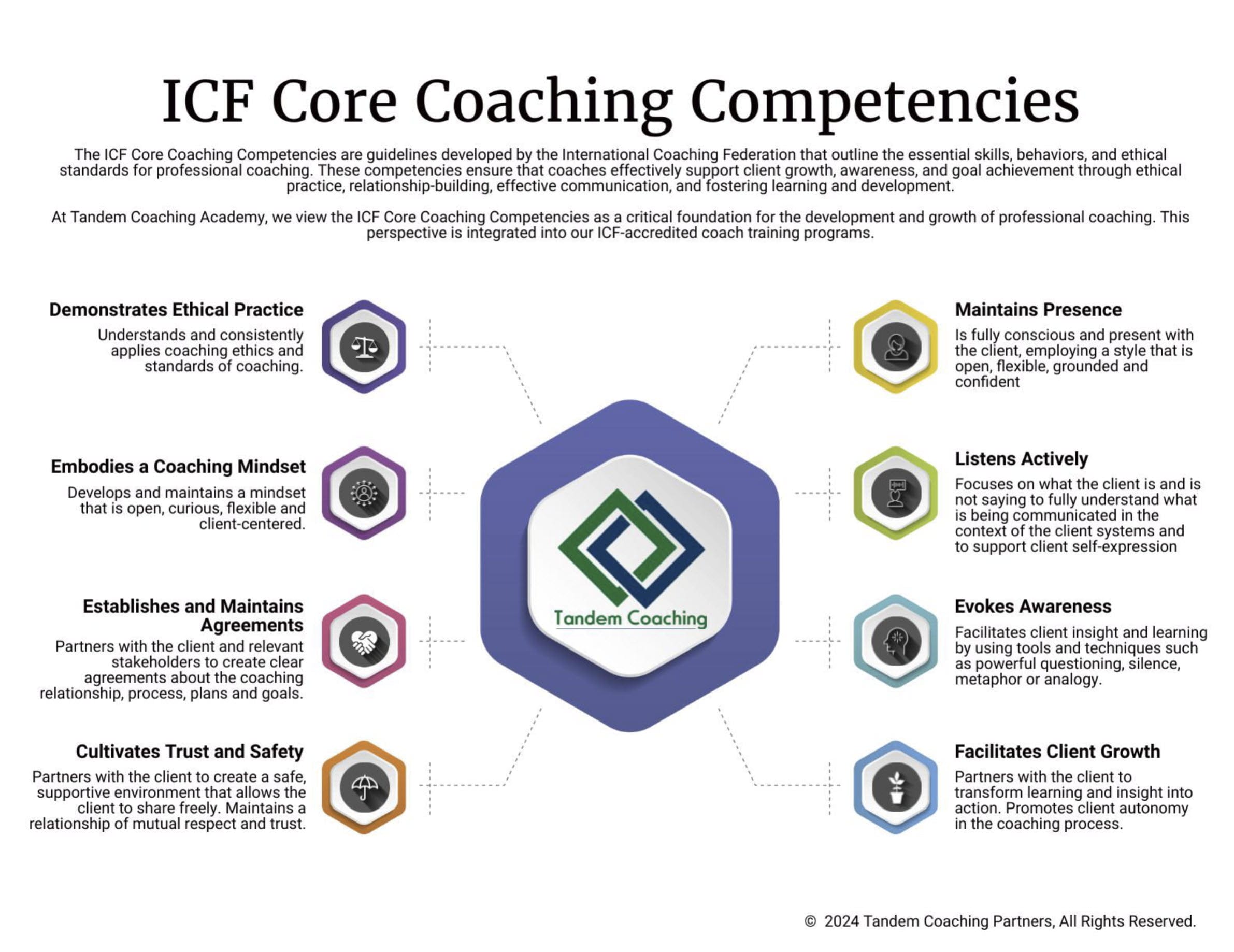Even coaching just one leader in an organization can have a ripple effect that improves soft skills in the whole organization. As a PCC-credentialed coach, you can be the one making that difference!
If you are on the journey to achieving your Professional Certified Coach (PCC) certification from the International Coaching Federation (ICF), you must first understand the PCC markers. These markers guide assessors in evaluating your coaching sessions and help you demonstrate the ICF Core Competencies effectively.
This blog post will explore the PCC markers, the updated list, and practical applications in coaching sessions. Additionally, we’ll explore common challenges and solutions, how to learn these markers before your assessment, and tips to prepare for the PCC assessment.
Start your PCC certification journey now!
What Are ICF PCC Markers?
ICF PCC markers are specific behaviors and skills that assessors look for in your coaching sessions to determine if you meet the competency standards for PCC certification. These markers are directly linked to the ICF core competencies and are designed to ensure consistency, reliability, and fairness in the assessment process. They also help you to self-assess whether you’re ready to apply for the PCC credential.

What is the Updated PCC Markers List?
Here is the updated list of PCC markers:
Demonstrates Ethical Practice
To achieve PCC certification, familiarity with the ICF code of ethics is essential. You must consistently demonstrate that your coaching aligns with these ethical guidelines throughout your sessions.
Embodies a Coaching Mindset
Embodying a coaching mindset means being open, curious, flexible, and client-centered. This involves ongoing learning and development, reflective practice, and preparation for sessions. These behaviors are assessed on your PCC certification journey.
Establishes and Maintains Agreements
In each session, the assessor will want to see evidence of you working with your clients to identify and confirm what they want to achieve. Make sure you define measures of success and explore the importance of these goals with your clients. That way, you maintain clarity and focus throughout your sessions.
Cultivates Trust and Safety
Building trust and safety involves acknowledging and respecting your client’s unique talents and insights. Show support, empathy, and concern to create a safe environment where clients feel comfortable expressing themselves.
Maintains Presence
Staying present means responding to the client as a whole person, considering their goals and aspirations. Allow pauses and reflection to create a more thoughtful and engaging coaching experience.
Listens Actively
Active listening involves customizing your questions based on your learning about the client. Explore their words, emotions, and non-verbal cues to better understand their perspective.
Evokes Awareness
Evoke awareness by asking powerful questions that challenge clients to think beyond their current mindset. Share observations without attachment, encouraging clients to explore new insights and perspectives.
Facilitates Client Growth
Facilitating growth means inviting clients to reflect on their progress and plan concrete steps for moving forward. Partner with them to design post-session actions and methods of accountability to ensure continued development.

Practical Applications of ICF PCC Markers in Coaching Sessions
Applying the PCC markers in your coaching sessions can significantly boost your effectiveness. Start by setting clear agreements at the beginning of each session to clarify what the client wants to achieve, establishing a focused and productive tone. Building trust is crucial—show genuine interest and empathy to help clients feel safe and more open during the sessions. Stay present by actively listening and responding to what the client is saying, avoiding distractions to remain fully engaged.
To evoke awareness, ask powerful questions that challenge clients to think deeply about their goals and actions. This encourages them to explore new perspectives and gain valuable insights. Finally, facilitate growth by encouraging clients to reflect on their learning and plan concrete steps for moving forward. This ensures that the coaching sessions lead to tangible progress and development for the clients. You can create a more effective and impactful coaching experience by consistently applying these PCC markers.

Challenges and Solutions to Help Achieve PCC Credentials
Achieving PCC credentials can be challenging, but understanding these common hurdles and solutions can help:
| Challenge | Solution |
| Understanding the Markers | Break them down into smaller, manageable parts and focus on one competency at a time. |
| Consistent Application | Practice regularly and seek feedback from mentor coaches. |
| Balancing Coaching and Learning | Create a structured study plan and schedule regular practice sessions. |
| Handling Performance Anxiety | Engage in mindfulness practices and seek support from peers or mentors. |
| Integrating Feedback | Actively incorporate feedback into your practice and reflect on your progress. |
How to Learn the ICF PCC Markers Before Assessment
Before your PCC assessment, it’s essential to familiarize yourself with the markers and practice applying them. Here are some effective ways to learn and internalize the ICF PCC markers:
- Enroll in Training Programs: Participate in ICF-accredited PCC training programs that focus on PCC markers to gain structured knowledge and practice.
- Engage in Mentor Coaching: Work with a mentor coach who can provide personalized feedback on your coaching sessions and help you refine your skills.
- Practice Coaching: Practice coaching with real clients to learn from your experience.
- Conduct Self-Study: Review ICF resources and practice applying the markers in mock sessions to build confidence and competence.
- Reflect on Your Practice: Regularly reflect on your coaching sessions to identify areas for improvement and track your progress. Go through transcripts of your coaching sessions to identify your strong and weak points, learning from experience.
These methods will help you build a solid understanding of the PCC markers and how to demonstrate them effectively in your coaching sessions.

Tips to Prepare for the PCC Assessment
Preparing for the PCC assessment requires a strategic approach. Begin by regularly practicing your coaching skills to internalize the markers. Consistent practice helps you become more comfortable and adept at demonstrating the required competencies.
- Practice Regularly: Make consistent practice a priority to internalize the PCC markers and enhance your coaching skills.
- Record Sessions: Recording your coaching sessions allows you to review and identify areas for improvement, making it easier to track your progress.
- Seek Feedback: Actively seek feedback from mentor coaches and peers to gain different perspectives and insights on your coaching style.
- Study the Markers: Thoroughly understand each PCC marker and how it applies to real coaching scenarios to ensure you can demonstrate them effectively.
- Stay Updated: Keep up with the latest updates and guidelines from ICF to ensure you are well-prepared and informed for your assessment.
By following these tips, you can approach your PCC assessment with confidence and readiness.
We can help you prepare. Benefit from our experience and succeed on your PCC certification journey. Start your PCC training here.

Frequently Asked Questions (FAQs)
Here are some frequently asked questions about PCC markers:
How Do ICF PCC Markers Impact Coaching Competency?
ICF PCC markers directly impact coaching competency by providing a clear framework for what assessors look for in a coaching session. They ensure that coaches meet the ICF core competencies, which enhances the overall quality and effectiveness of coaching.
What is the Significance of ICF PCC Markers in Professional Coaching?
The significance of ICF PCC markers in professional coaching lies in their ability to standardize the evaluation process. They provide a consistent, fair, and reliable method for assessing coaching skills, ensuring that coaches meet a high standard of practice.
How Do ICF PCC Markers Differ From ACC and MCC Markers?
ICF PCC markers are designed for the Professional Certified Coach level, requiring a deeper level of skill and competency than ACC (Associate Certified Coach) markers. Each certification level has specific markers that reflect the expected competencies and behaviors appropriate for that certification level.
Conclusion
Understanding and applying the ICF PCC markers will help any coach aiming to achieve PCC certification. By familiarizing yourself with the markers, practicing regularly, and seeking feedback, you can enhance your coaching skills and confidently approach your assessment. If you embrace the journey of continuous learning and development, you’ll be well on your way to becoming a more effective and impactful coach.
Are you ready to get your PCC certification? We have an ICF-accredited training program, highly qualified mentor coaches, and plenty of experience to guide you. Let’s get started with your PCC certification!

Unlock Your Coaching Potential with Tandem!
Dive into the essence of effective coaching with our exclusive brochure, meticulously crafted to help you master the ICF Core Coaching Competencies.
"*" indicates required fields
About the Author
Cherie Silas, MCC
She has over 20 years of experience as a corporate leader and uses that background to partner with business executives and their leadership teams to identify and solve their most challenging people, process, and business problems in measurable ways.















